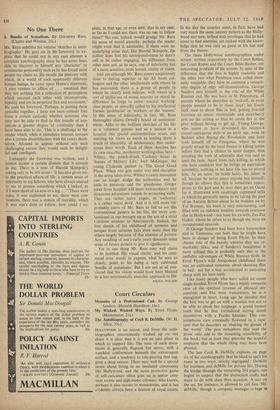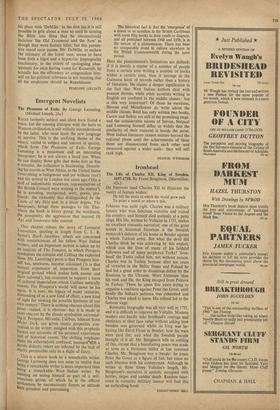Court Circulars
HOLLYWOOD is an island, and from the auto- biographies intermittently washed up on our shore it is clear that it is not an easy place in which to support life. The note of such docu- ments is generally flagrant but nervy, with a watchful conformism beneath the extravagant surface, and a tendency to role-playing that sug- gests a deep unease. There may well be a special strain about living in an insulated community like Hollywood, and the same protective game of self-caricature often goes on in senior com- mon rooms and diplomatic colonies; who knows, perhaps it also occurs in monasteries, and it has evidently always been a feature of royal courts.
In his day the courtier must, in fact, have had very much the same anxiety pattern as the Holly- wood star now, bribed with privileges that he had come to find essential, yet racked with the know- ledge that he was only as good as his last nod from the throne. . .
The three Hollywood autobiographies under review, written respectively by the Court Rotter, the Court Rapist and the Court Bible-Basher, are interesting products of the system. In spite of the difference that the first is highly readable and the other two what Perelman once called emin- ently weedable, they have in common a remark- able degree of edgy self-dramatisation. George Sanders sees himself in the role of the White Russian cad. He was born in St. Petersburg, of parents whom he describes as 'well-off, as most people seemed to be in those days'; his Uncle Jack used to shoot flies in bed, getting liveried footmen to smear marmalade and strawberry jam on the ceiling so that he could fire at the prey without having to get up. Young George, who seems to have developed , his relative's casual-outrageous style at an early age, went to Bedales after fleeing the Revolution and later took himself off to Patagonia, where he was greatly struck by the local finesse in killing lambs before they had a chance to scent danger, thus avoiding the rush of adrenalin that 'was said to spoil the taste. Apart from lady-killing, to which one feels confident that he brings an equivalent sensibility, nothing in his later life has so stirred him. As an actor, he holds lazily, his talent is nil, because he never plays anyone but himself; though he allows that this is sometimes appro- priate to the part and he may then get an Oscar for it. Illustrated with insultingly captioned stills in which he generally seems to be taking the part of an Ancient Briton about to be trodden on by Yul Brynner, his book is very entertaining, and filled with an indolent hostility towards everyone else in Hollywood—not least his ex-wife, Zsa-Zsa Gabor, whom he refers to as though she were an occupational neurosis.
If George Sanders had been born humourless and in Tasmania, one feels that he might have been in danger of being Errol Flynn. In their chosen role of the beastly amorist they are re- markably alike, and if Sanders's beastliness is more refined this is probably only due to the ineffable advantages of White Russian birth. In Errol Flynn's wild Antipodean childhood there was no cultivated nonsense about shooting flies in bed : not for a boy accustomed to castrating sheep with his bare teeth.
Like many people who have sailed an ocean single-handed, Errol Flynn has a highly romantic view of the spiritual revenue of physical dis- comfort; and like most womanisers, he is a misogynist at heart. Long ago he decided that the best way to get on with a woman was not to be able to speak her language, a grand human truth that he first formulated during dumb manoeuvres with a Pacific Islander. This con- temptuous view eventually flowered in a rapc- case that he describes as 'shaking the glands of the world.' The pert metaphors that stud the prose only add to the mounting resistibility of the book; but at least they provoke the hopeful suspicion that the whole thing may have been ghosted.
The late Cecil B. DeMille explains on page six of his autobiography that he liked to spell his
name in two ways, strictly segregated : DeMille for business, and deM ille for private life. During the trudge through the remaining 394 pages, one begins to suspect that the distinction really had more to do with class than occasion. A star on the set, for instance, is allowed to call him 'Mr. deM ille,' though a company manager is kept in
his place with 'DeMille.' In the first lap it is still possible to grin about a man so used to turning the Bible into films that he unconsciously italicises 'the Old Testament and the New' as though they were feature titles; but this permis- sive mood soon passes. Mr. DeMille, to eschew the intimacy of the lower case, seems to have been both a bigot and a hypocrite. Impregnably reactionary, to the extent of apologising obse- quiously for once having voted for Roosevelt, he actually has the effrontery to congratulate him- self on his political tolerance in not insisting that all his employees should be Republicans.
PENELOPE GILLIATT























































 Previous page
Previous page